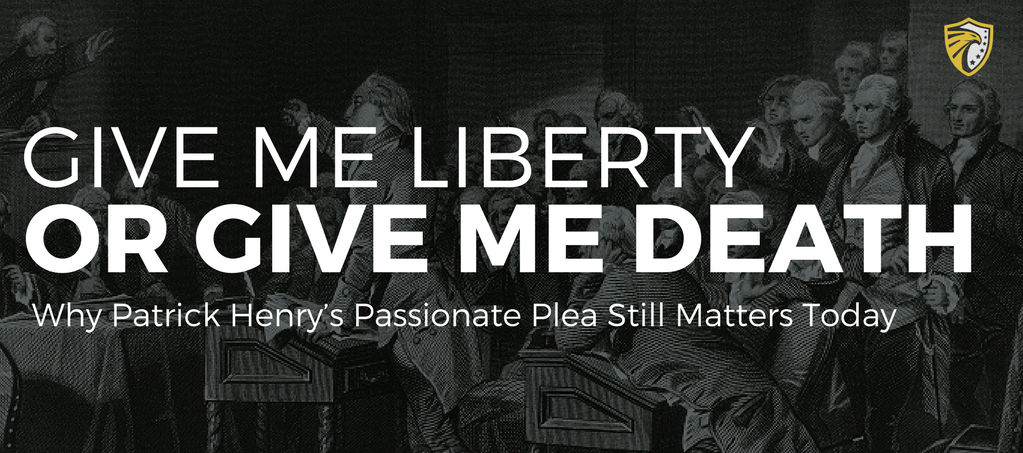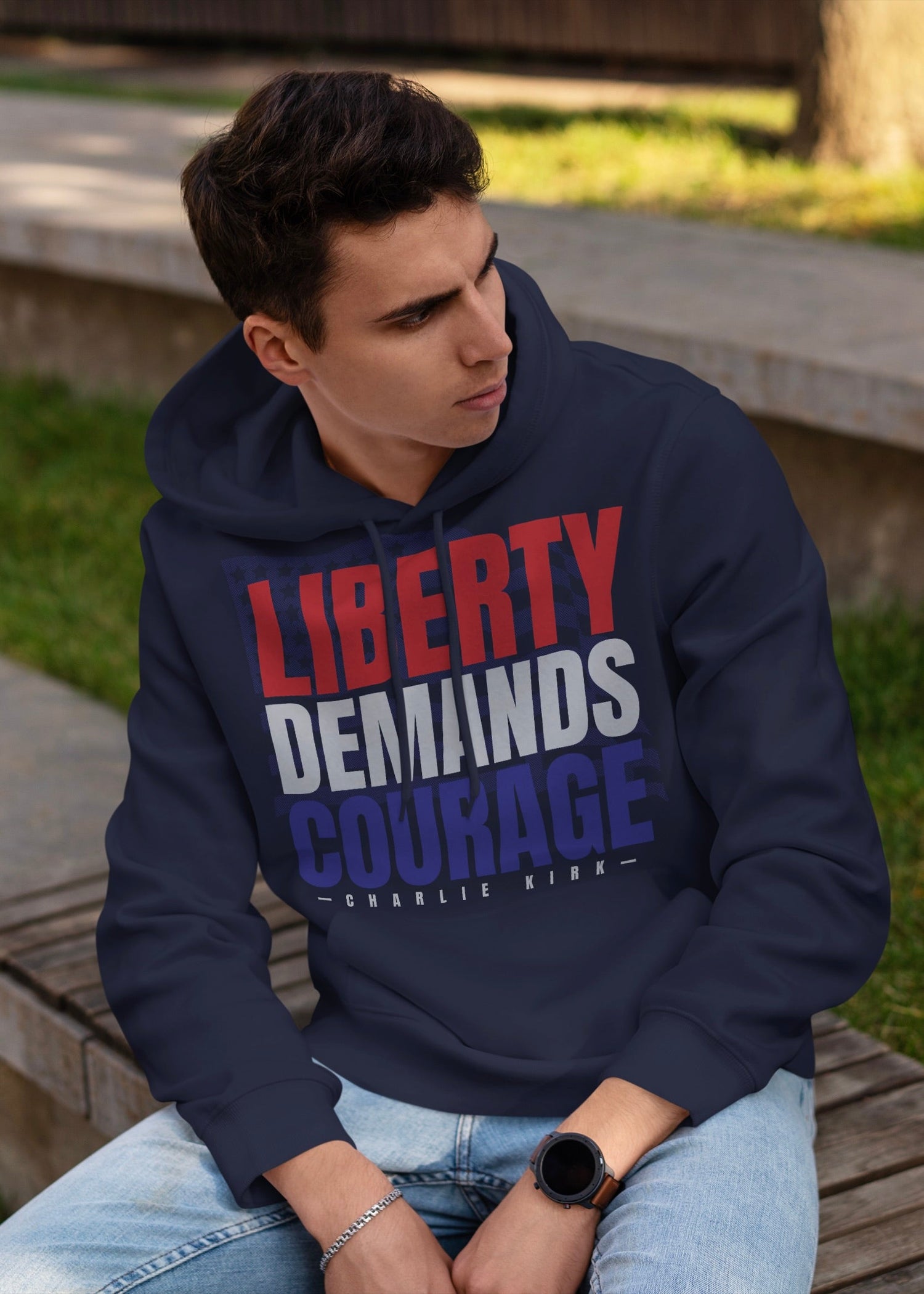
Give Me Liberty or Give Me Death
On March 23, 1775, Patrick Henry stood before the Second Virginia Convention and sounded one of the most famous calls to arms in American history. At the time, the colonies were disorganized, disunified, and disgruntled as debate ensued over forming defensive militias against the British. Many still believed that diplomacy would overcome any contention with Great Britain, but Henry understood the road that lie before them.
Revolution was coming. The first Continental Congress ended months prior with a grievance petition to King George III. The Boston harbor was now under British blockade as a punishment for the 1773 Boston Tea Party. Certain colonies were even boycotting British goods. Tensions were mounting, leading to a second convention with intentions of discussing Virginia’s role in negotiating with the Crown.
Patrick Henry, a prominent Virginian lawyer and recent delegate to the Continental Congress, was a leader among many as 120 delegates arrived at the Second Virginia Convention. George Washington and Thomas Jefferson, as well as many other Declaration of Independence signers were in the room that day, all witnesses of Henry’s passionate plea.
Henry understood that war with Britain was not just an option, it was an inevitably. He knew the best way to begin preparing the colonies was to pass a resolution that raised county militiamen. This was not a new idea at the time, many other colonies had passed similar resolutions. Henry himself had raised a volunteer outfit in his home county. However, tensions were high amongst the Convention, and many still believed that there were options outside of gunfire.
As the debate began, Patrick Henry grew more and more impatient. He listened as men gave prolonged speeches of wordy arguments and over-educated reason. He watched as the room grew weary of discussion, and after allowing many to speak, a passionate Patrick Henry finally rose. In one historical account, it states that a “Baptist minister who was watching the proceedings would later describe him as having ‘an unearthly fire burning in his eye.’”
"Let us not, I beseech you, sir, deceive ourselves. Sir, we have done everything that could be done, to avert the storm which is now coming on. We have petitioned; we have remonstrated; we have supplicated; we have prostrated ourselves before the throne, and have implored its interposition to arrest the tyrannical hands of the ministry and Parliament.
Our petitions have been slighted; our remonstrances have produced additional violence and insult; our supplications have been disregarded; and we have been spurned, with contempt, from the foot of the throne. In vain, after these things, may we indulge the fond hope of peace and reconciliation. There is no longer any room for hope.
If we wish to be free, if we mean to preserve inviolate those inestimable privileges for which we have been so long contending, if we mean not basely to abandon the noble struggle in which we have been so long engaged, and which we have pledged ourselves never to abandon until the glorious object of our contest shall be obtained, we must fight! I repeat it, sir, we must fight! An appeal to arms and to the God of Hosts is all that is left us!”
The speech was followed by silence, delegates clinging to their loyalist stance. However, when it came time for a vote, the numbers awarded Henry with defensive action. Henry was then appointed the head of a new committee charged with preparing the Virginia militia for combat. And not a moment too soon, as weeks later “the shot heard round the world” blasted through the colonies announcing the bloody start to the Revolutionary War. Henry continued as a delegate to Virginia, eventually becoming the state’s governor. He’s credited for many accomplishments in American history, but it was his will to stand and speak up that bears his legacy.

As Thomas Jefferson once wrote, “It is not now easy to say what we should have done without Patrick Henry. He was before us all in maintaining the Spirit of the Revolution.”
WHY does this speech and others like it still matter today? How does this apply to our current state as a country?
It’s simple. The foundation of Patrick Henry’s passion, the motivation behind this very speech represents a truth that remains absolutely relevant to our America. We live in a culture of challenge. A society of tolerance and compromise. As Patrick Henry stood to challenge his fellow patriots, he was facing the same test. Would he compromise freedom in the midst of so many willing to tolerate British oppression?

We often hear of those who oppose the literal interpretation of the Declaration of Independence or the US Constitution. We hear it’s outdated, it doesn’t apply to our culture, it was written by slave-owners, the list goes on. Somehow, we seem to miss the foundational value that remains a generational guide: that TRUTH, VIRTUE, and MORALITY do not change according to the whims of current society. The principles of a free people do not diminish in the face of culture, political persuasion, or just what we deem right in the moment.
The foundational truth these men held and that must be held today is that our freedoms and rights, our liberty does not come from man or government. It comes from God, and God alone.
The founding fathers knew this. That’s why they included it in our nation’s founding document:
“We hold these truths to be self-evident, that all men are created equal, that they are endowed by their Creator with certain unalienable Rights, that among these are Life, Liberty and the pursuit of Happiness.”
Patriots like Patrick Henry, George Washington, or Thomas Jefferson shouldn’t be talked about simply in terms of historical feats or powerful speeches. Their passion for liberty and freedom applies to today’s broken and confused culture. We exist in dissension, we operate in hate and secularism. We walk around as Americans, constantly denying where our freedom really comes from. Hence, all the social tension we have today. The foundation of who we are as Americans is at risk!
Patrick Henry remains a hero in the 21st century because his passion for individual liberty is desperately needed in present-day patriots. His words were inspirational to a new nation and are invaluable to all present-day Defenders of the Republic. We call upon those, not just in government or in positions of power, to recognize these truths. But we do not stop there.

Everyday Americans MUST join the fight for freedom. From the single mom, faithfully protecting her family, to America’s boardroom, to the marketplace, to the moldable minds in every classroom. These principles of freedom and liberty should not pass into the rearview mirror of history! We believe our greatest days should be ahead. But is up to us. We must preserve and cherish the words, the warnings, the wisdom of our forefathers. We must use our voice to unify and to shed light on our nation’s foundational truths! Will you join us?



